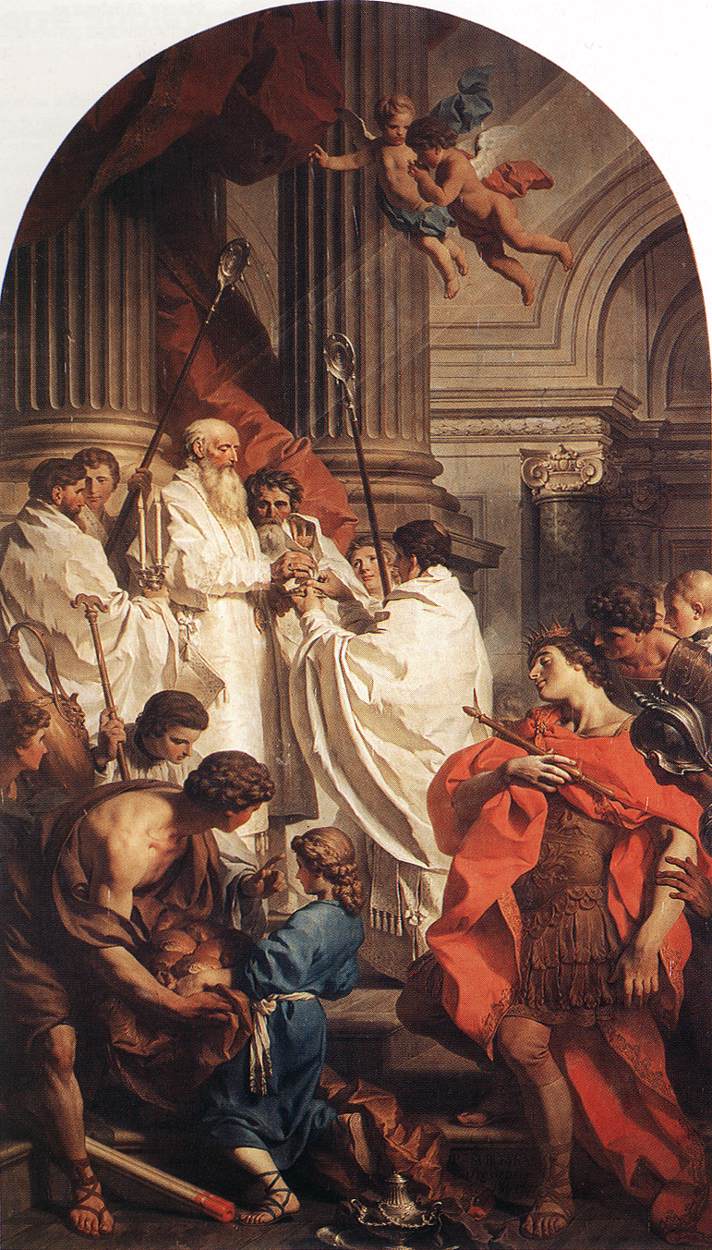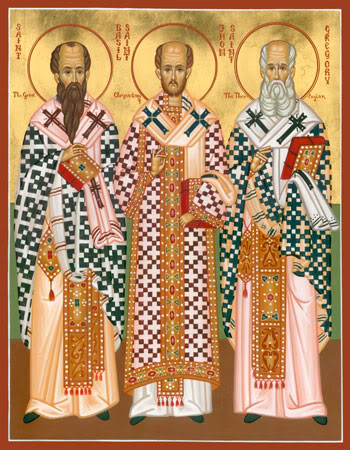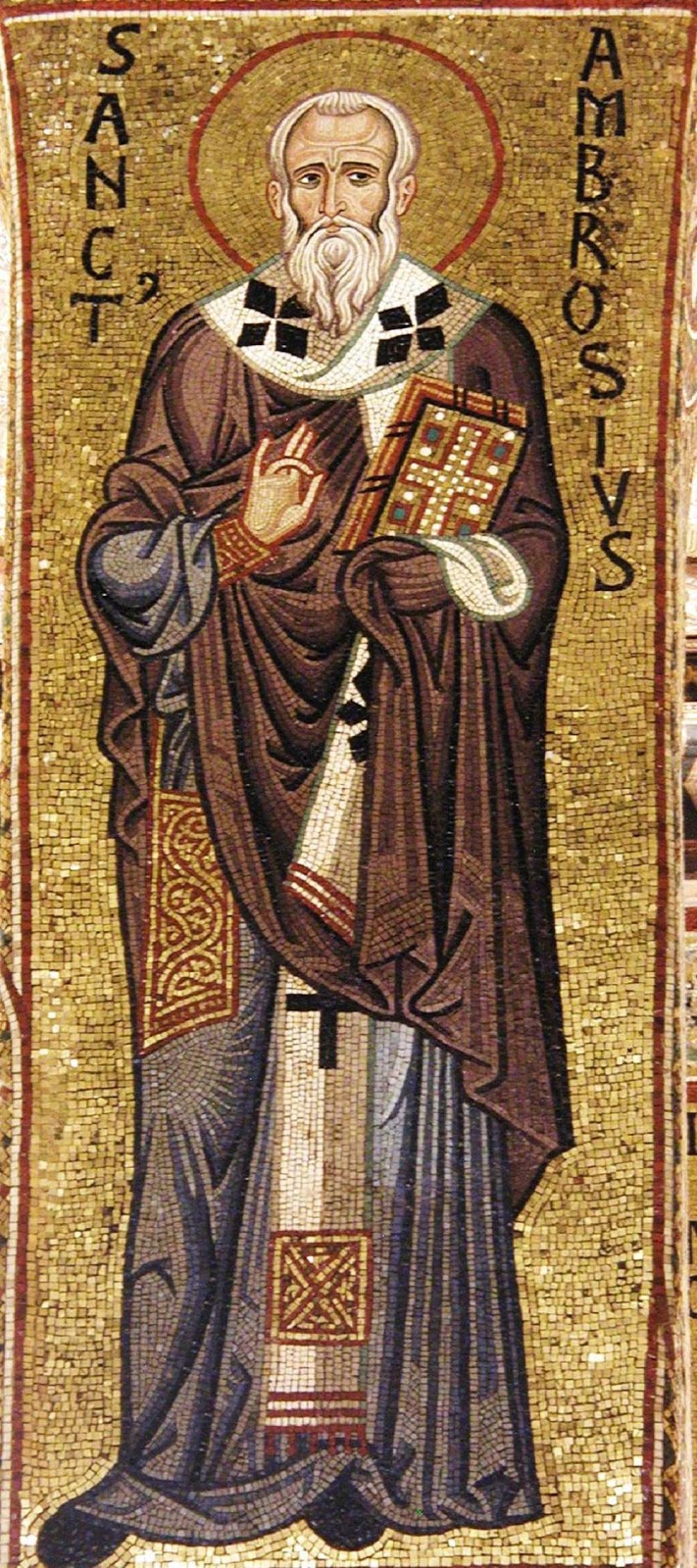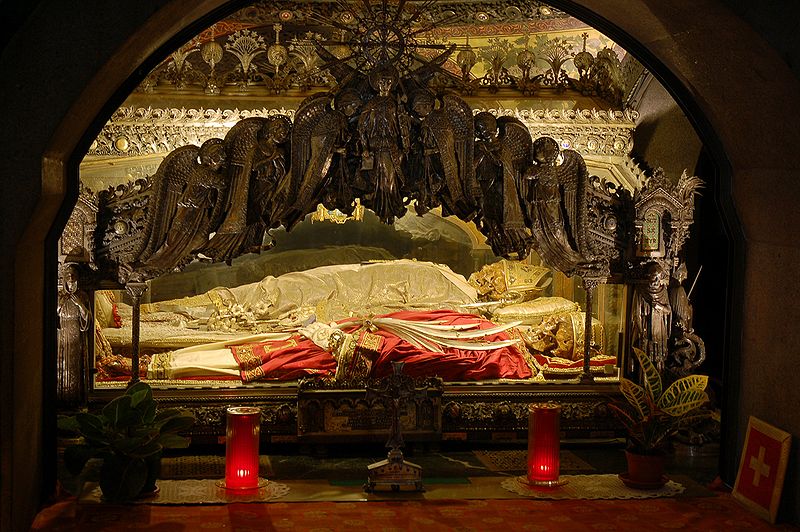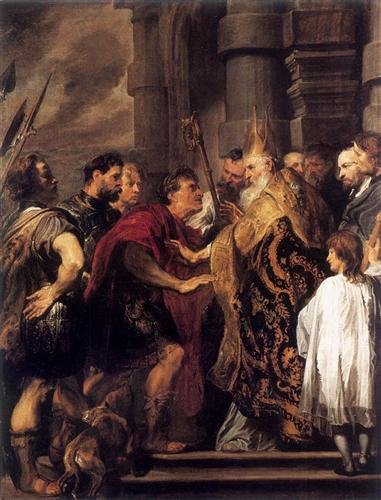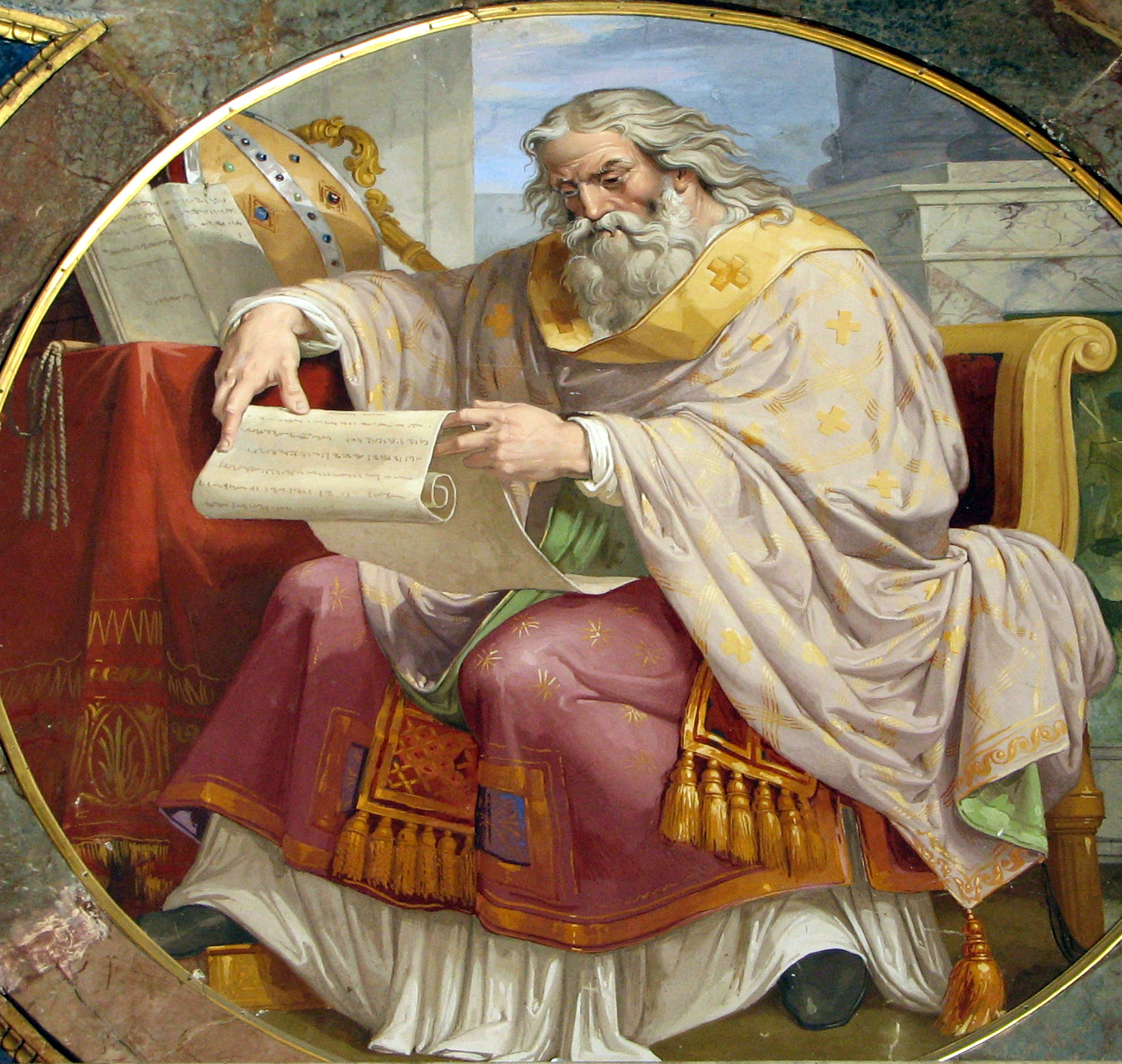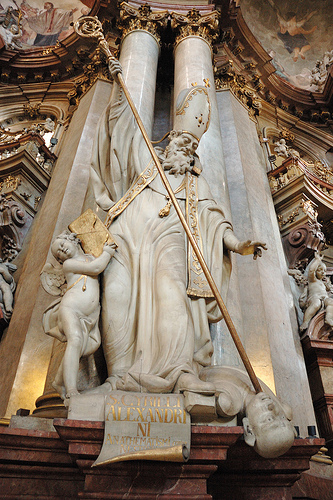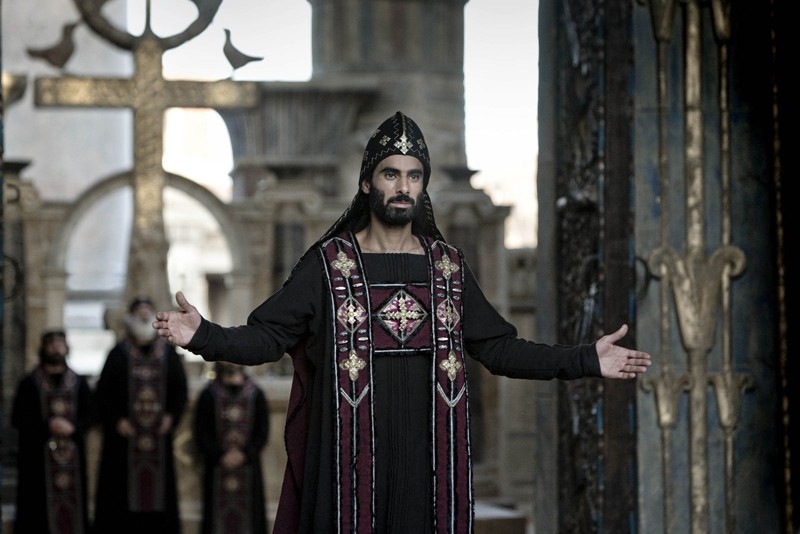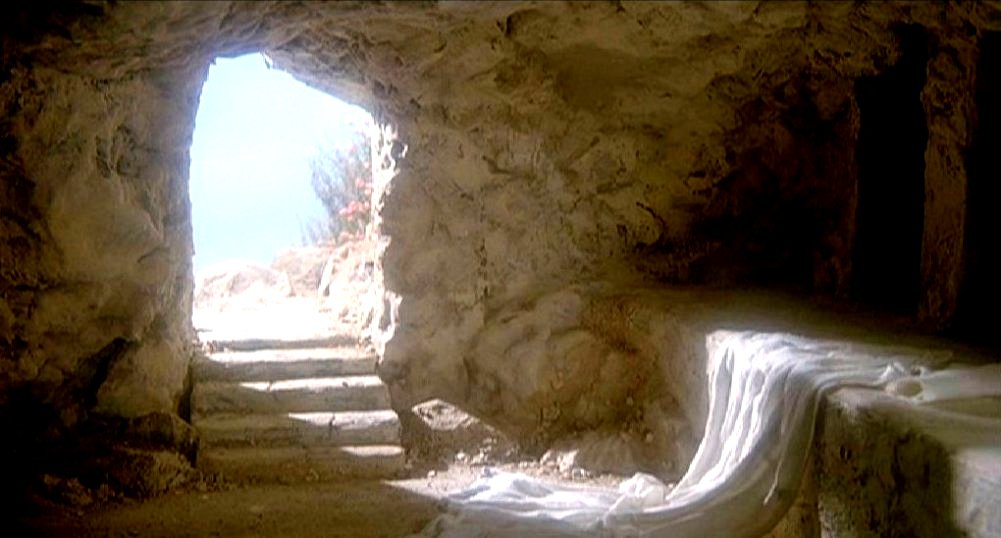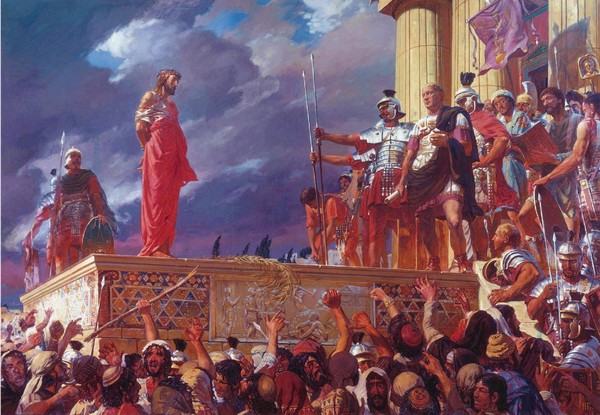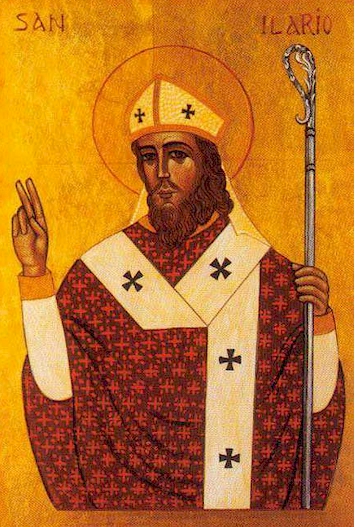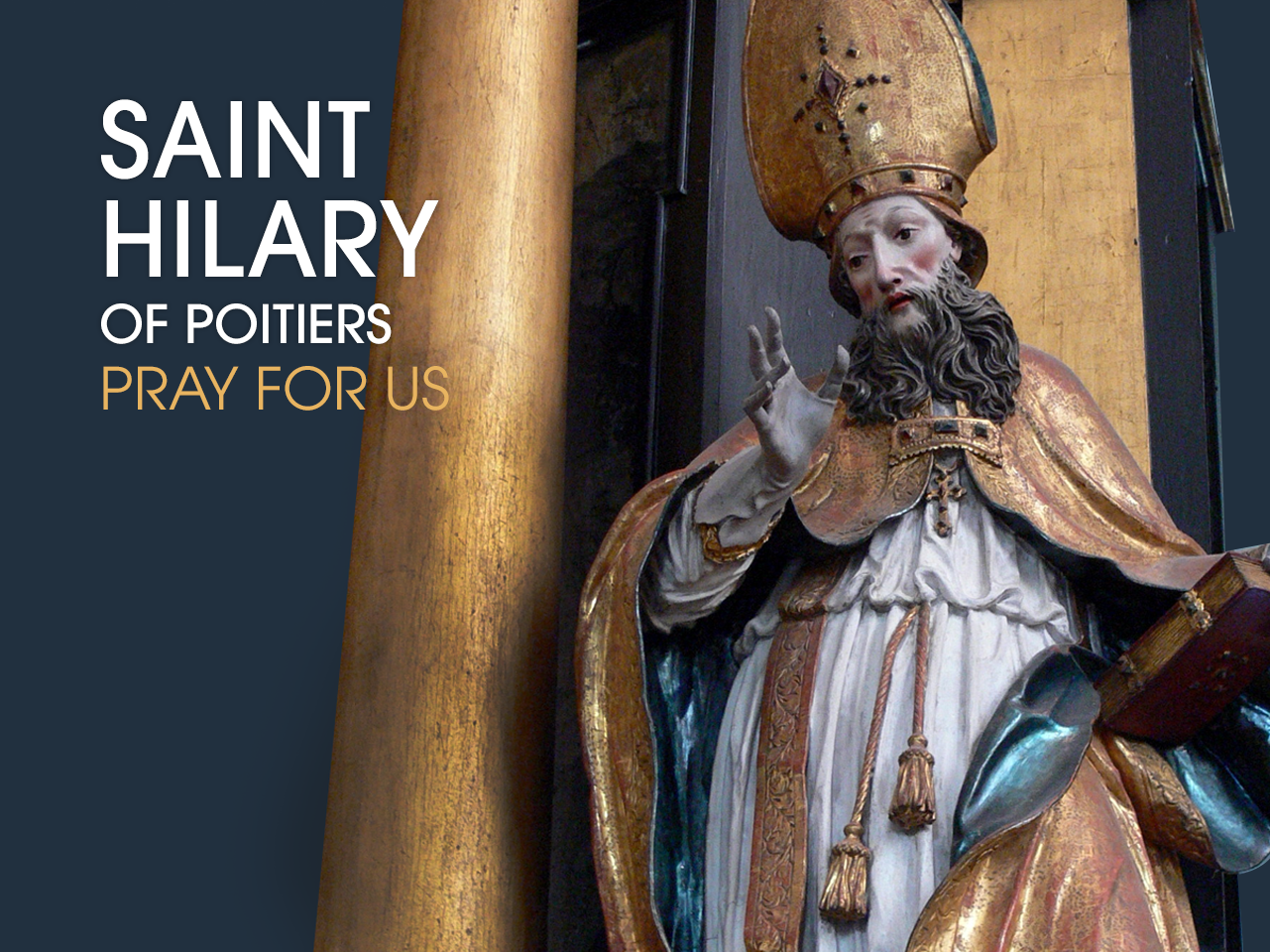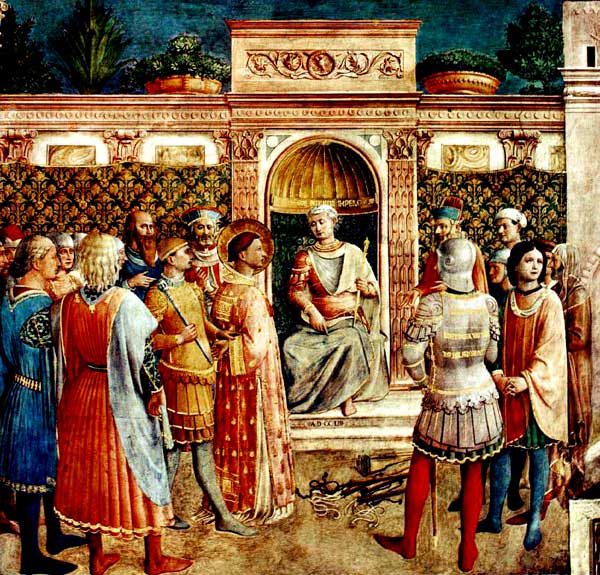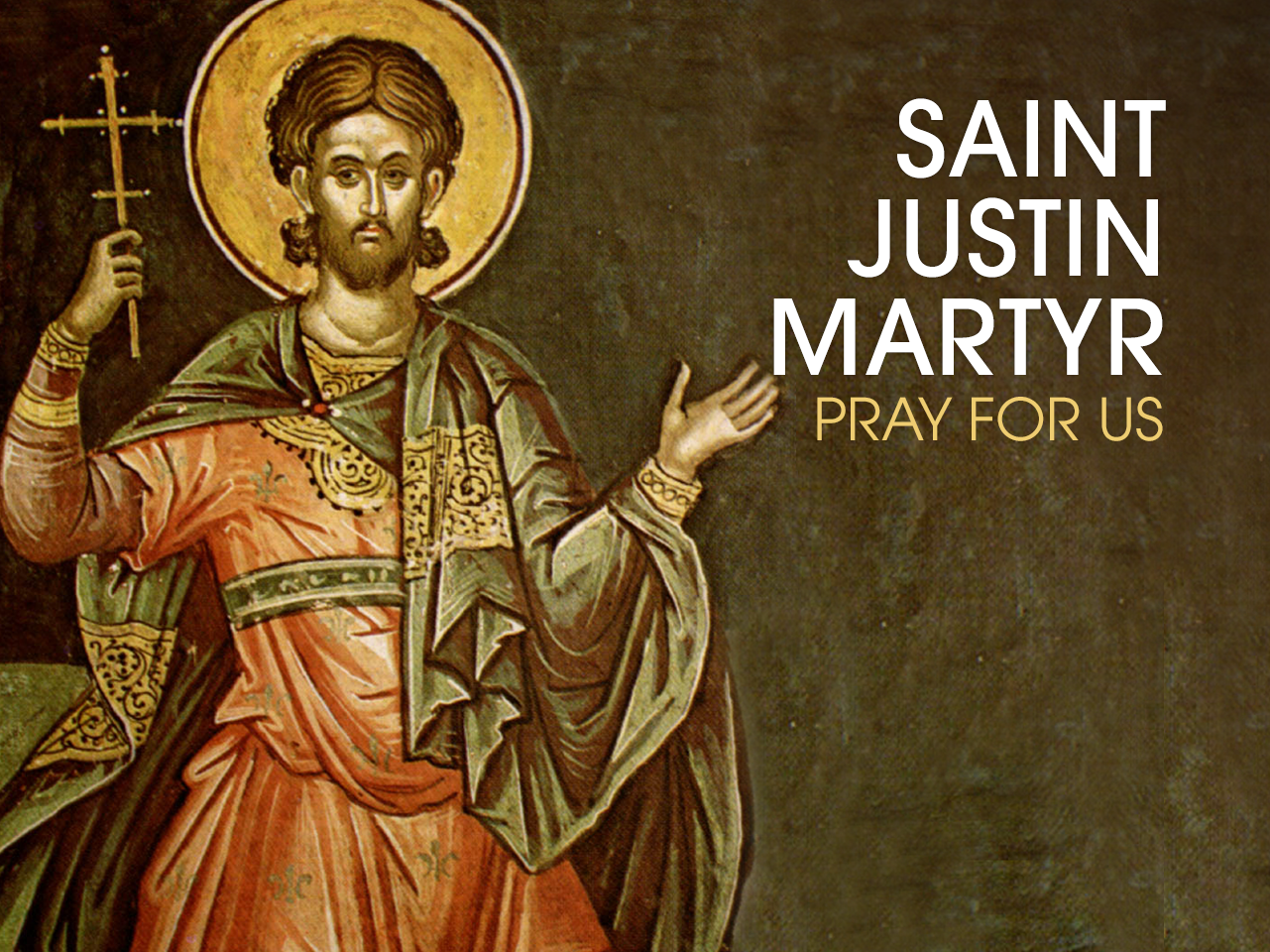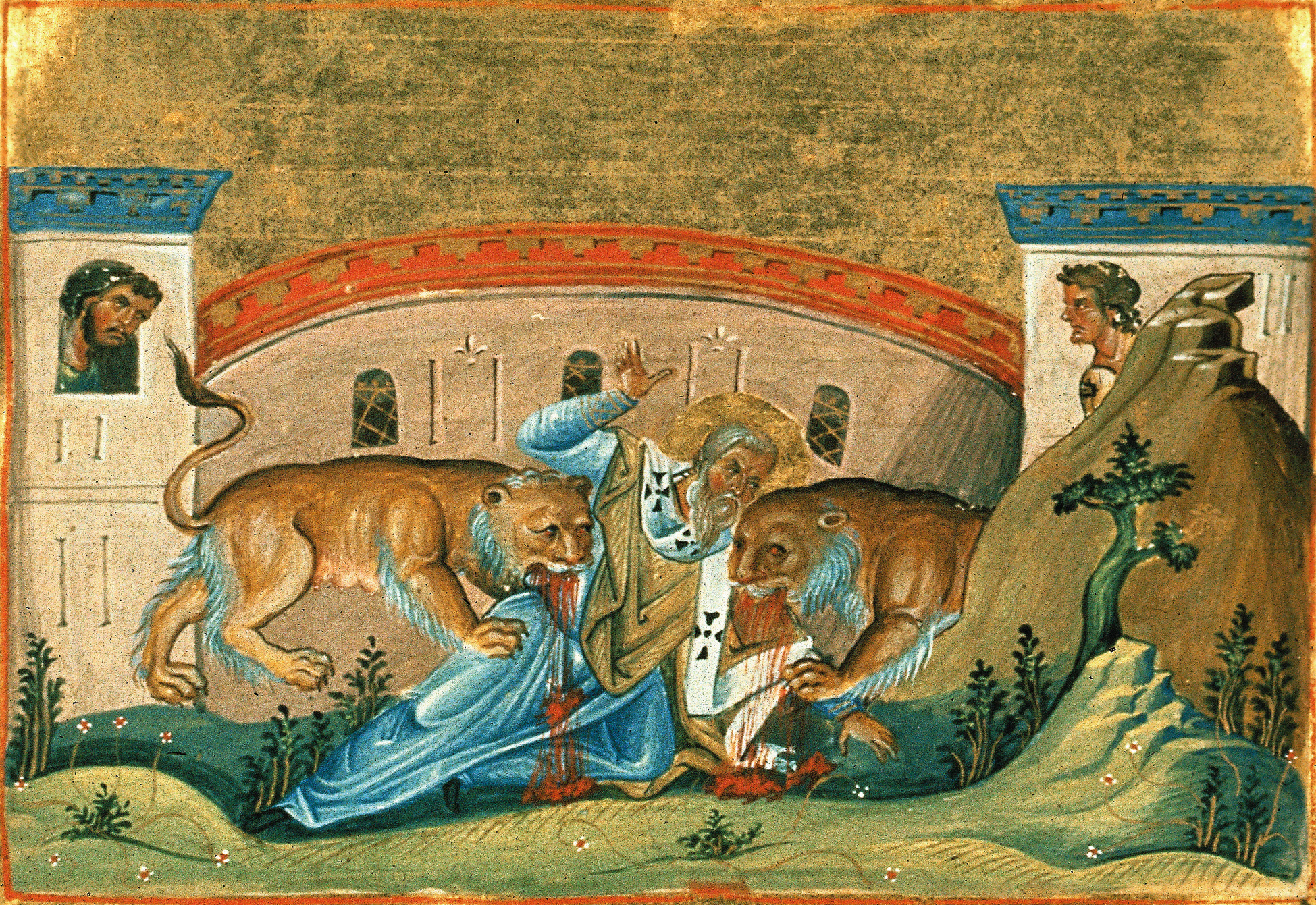
-painting of the martyrdom of St Ignatius of Antioch from the Menologion of Basil II (c. 1000 AD). In 637 AD, his relics were transferred to the Basilica di San Clemente in Rome. Please click on the image for greater detail.
My parents had friends who “made”, very Catholic, no democracy here, no popular opinion sought, each of their several children take the Confirmation name “Polycarp”! Funny! 🙂
I can just imagine going down the line of the Confirmation class of eighth graders, every year or so, to the offspring of this family, and the next “victim” mumbling, as softly as possible, “polycarp”, and then the ensuing snorts and guffaws of their immature peers. Awesome! Growing up Catholic! You can see/hear the character building in the crimson face! Intentional, loving humiliation toughens us up for life! We’ll need it! We are unsure to this day whether my parents’ friends were cruel or had an unusual sense of humor? St Polycarp was a friend of St Ignatius of Antioch. Both are understood to have been disciples of The Apostle St John. The writings of Ignatius of Antioch attest to the sacramental and hierarchical nature of the Church.
In a 2007 general audience on St. Ignatius of Antioch, Pope Benedict XVI observed that “no Church Father has expressed the longing for union with Christ and for life in him with the intensity of Ignatius.” In his letters, the Pope said, “one feels the freshness of the faith of the generation which had still known the Apostles. In these letters, the ardent love of a saint can also be felt.”
Born in Syria in the middle of the first century A.D., Ignatius is said to have been personally instructed – along with another future martyr, Saint Polycarp – by the Apostle Saint John. When Ignatius became the Bishop of Antioch around the year 70, he assumed leadership of a local church that was, according to tradition, first led by Saint Peter before his move to Rome.
Although St. Peter transmitted his Papal primacy to the bishops of Rome rather than Antioch, the city played an important role in the life of the early Church. Located in present-day Turkey, it was a chief city of the Roman Empire, and was also the location where the believers in Jesus’ teachings and his resurrection were first called “Christians.”
Ignatius led the Christians of Antioch during the reign of the Roman Emperor Domitian, the first of the emperors to proclaim his divinity by adopting the title “Lord and God.” Subjects who would not give worship to the emperor under this title could be punished with death. As the leader of a major Catholic diocese during this period, Ignatius showed courage and worked to inspire it in others.
After Domitian’s murder in the year 96, his successor Nerva reigned only briefly, and was soon followed by the Emperor Trajan. Under his rule, Christians were once again liable to death for denying the pagan state religion and refusing to participate in its rites. It was during his reign that Ignatius was convicted for his Christian testimony and sent from Syria to Rome to be put to death.
Escorted by a team of military guards, Ignatius nonetheless managed to compose seven letters: six to various local churches throughout the empire (including the Church of Rome), and one to his fellow bishop Polycarp who would give his own life for Christ several decades later.
Ignatius’ letters passionately stressed the importance of Church unity, the dangers of heresy, and the surpassing importance of the Eucharist as the “medicine of immortality.” These writings contain the first surviving written description of the Church as “Catholic,” from the Greek word indicating both universality and fullness.
One of the most striking features of Ignatius’ letters, is his enthusiastic embrace of martyrdom as a means to union with God and eternal life. “All the pleasures of the world, and all the kingdoms of this earth, shall profit me nothing,” he wrote to the Church of Rome. “It is better for me to die in behalf of Jesus Christ, than to reign over all the ends of the earth.”
“Now I begin to be a disciple,” the bishop declared. “Let fire and the cross; let the crowds of wild beasts; let tearings, breakings, and dislocations of bones; let cutting off of members; let shatterings of the whole body; and let all the dreadful torments of the devil come upon me: only let me attain to Jesus Christ.”
St. Ignatius of Antioch bore witness to Christ publicly for the last time in Rome’s Flavian Amphitheater, where he was mauled to death by lions. “I am the wheat of the Lord,” he had declared, before facing them. “I must be ground by the teeth of these beasts to be made the pure bread of Christ.” His memory was honored, and his bones venerated, soon after his death around the year 107.
“It is not that I want merely to be called a Christian, but to actually be one. Yes, if I prove to be one, then I can have the name.”
—St. Ignatius of Antioch
“Take care to do all things in harmony with God, with the bishop presiding in the place of God, and with the presbyters in the place of the council of the apostles, and with the deacons, who are most dear to me, entrusted with the business of Jesus Christ, who was with the Father from the beginning and is at last made manifest.” — Letter to the Magnesians 2, 6:1
“There is one Physician who is possessed both of flesh and spirit; both made and not made; God existing in flesh; true life in death; both of Mary and of God; first passible and then impassible, even Jesus Christ our Lord.” —Letter to the Ephesians, ch. 7, shorter version, Roberts-Donaldson translation
He stressed the value of the Eucharist, calling it a “medicine of immortality” (Ignatius to the Ephesians 20:2). The very strong desire for bloody martyrdom in the arena, which Ignatius expresses rather graphically in places, may seem quite odd to the modern reader. An examination of his theology of soteriology shows that he regarded salvation as one being free from the powerful fear of death and thus to bravely face martyrdom.
“Be not seduced by strange doctrines nor by antiquated fables, which are profitless. For if even unto this day we live after the manner of Judaism, we avow that we have not received grace … If then those who had walked in ancient practices attained unto newness of hope, no longer observing Sabbaths but fashioning their lives after the Lord’s day, on which our life also arose through Him and through His death which some men deny … how shall we be able to live apart from Him? … It is monstrous to talk of Jesus Christ and to practise Judaism. For Christianity did not believe in Judaism, but Judaism in Christianity.” — Ignatius to the Magnesians 8:1, 9:1-2, 10:3, Lightfoot translation.
He is also responsible for the first known use of the Greek word katholikos (καθολικός), meaning “universal”, “complete” and “whole” to describe the church, writing:
“Wherever the bishop appears, there let the people be; as wherever Jesus Christ is, there is the Catholic Church. It is not lawful to baptize or give communion without the consent of the bishop. On the other hand, whatever has his approval is pleasing to God. Thus, whatever is done will be safe and valid.” — Letter to the Smyrnaeans 8, J.R. Willis translation.
It is from the word katholikos (“according to the whole”) that the word catholic comes. When Ignatius wrote the Letter to the Smyrnaeans in about the year 107 and used the word catholic, he used it as if it were a word already in use to describe the Church. This has led many scholars to conclude that the appellation Catholic Church with its ecclesial connotation may have been in use as early as the last quarter of the 1st century. On the Eucharist, he wrote in his letter to the Smyrnaeans:
“Take note of those who hold heterodox opinions on the grace of Jesus Christ which has come to us, and see how contrary their opinions are to the mind of God … They abstain from the Eucharist and from prayer because they do not confess that the Eucharist is the flesh of our Savior Jesus Christ, flesh which suffered for our sins and which that Father, in his goodness, raised up again. They who deny the gift of God are perishing in their disputes.” — Letter to the Smyrnaeans 6:2–7:1
Saint Ignatius’s most famous quotation, however, comes from his letter to the Romans:
“I am writing to all the Churches and I enjoin all, that I am dying willingly for God’s sake, if only you do not prevent it. I beg you, do not do me an untimely kindness. Allow me to be eaten by the beasts, which are my way of reaching to God. I am God’s wheat, and I am to be ground by the teeth of wild beasts, so that I may become the pure bread of Christ.” — Letter to the Romans
“I greet you in the blood of Jesus Christ, which is eternal and abiding joy.” -St. Ignatius of Antioch
“We recognize a tree by its fruit and we ought to be able to recognize a Christian by his action.”
-St. Ignatius of Antioch
“It is right, therefore, that we not just be called Christians, but that we actually be Christians.”
-St. Ignatius of Antioch
“You have never begrudged the martyrs their triumph but rather trained them for it. And so I am asking you to be consistent with the lessons you teach them. Just beg for me the courage and endurance not only to speak but also to will what is right, so that I may not only be called a Christian, but prove to be one. For if I prove myself to be a Christian by martyrdom, then people will call me one, and my loyalty to Christ will be apparent when the world sees me no more. Nothing you can see is truly good. For our Lord Jesus Christ, now that he has returned to His Father, has revealed himself more clearly. Our task is not one of producing persuasive propaganda; Christianity shows its greatness when it is hated by the world.”
—St. Ignatius of Antioch
“The Church, which has spread everywhere, even to the ends of the earth, received the faith from the apostles and their disciples … Having one soul and one heart, the Church holds this faith, preaches and teaches it consistently as though by a single voice. For though there are different languages, there is but one tradition. … Just as God’s creature, the sun, is one and the same the world over, so also does the Church’s preaching shine everywhere to enlighten all men who want to come to a knowledge of the truth. Now of those who speak with authority in the churches, no preacher however forceful will utter anything different—for no one is above the Master—nor will a less forceful preacher diminish what has been handed down. Since our faith is everywhere the same, no one who can say more augments it, nor can anyone who says less diminish it.”
—St. Ignatius of Antioch
“It is better to be silent and to be real than to talk and not be real. It is good to teach if one does what one says. Now there is one such teacher who spoke and it happened. Indeed, even the things he has done in silence are worthy of the Father. The one who truly possesses the word of Jesus is also able to hear his silence, that he may be perfect, that he may act through what he says and be known through his silence. Nothing is hidden from the Lord; even our secrets are close to him. Therefore, let us do everything with the knowledge that he dwells in us, in order that we may be his temples, and he may be in us as our God, as in fact he really is, as will be made clear in our sight by the love which we justly have for him.” -St Ignatius of Antioch, Letter to the Ephesians
“No earthly pleasures, no kingdoms of this world can benefit me in any way. I prefer death in Christ Jesus to power over the farthest limits of the earth. He who died in place of us is the one object of my quest. He who rose for our sakes is my one desire.” –St. Ignatius of Antioch
“The Church, which has spread everywhere, even to the ends of the earth, received the faith from the apostles and their disciples … Having one soul and one heart, the Church holds this faith, preaches and teaches it consistently as though by a single voice. For though there are different languages, there is but one tradition. … Just as God’s creature, the sun, is one and the same the world over, so also does the Church’s preaching shine everywhere to enlighten all men who want to come to a knowledge of the truth. Now of those who speak with authority in the churches, no preacher however forceful will utter anything different—for no one is above the Master—nor will a less forceful preacher diminish what has been handed down. Since our faith is everywhere the same, no one who can say more augments it, nor can anyone who says less diminish it.”
—St. Ignatius of Antioch
“He who is devout to the Virgin Mother will certainly never be lost.”
-St. Ignatius of Antioch
Prayer for the Deceased
“Receive in tranquility and peace, O Lord, the souls of your servants who have departed this present life to come to You. Grant them rest and place them in the habitations of light, the abodes of blessed spirits. Give them the life that will not age, good things that will not pass away, delights that have no end, through Jesus. Amen.
–St Ignatius of Antioch
Love,
Matthew



